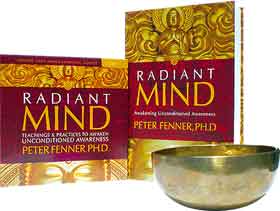How is it that Unconditioned experience, is a conditioned experience?
I hope you enjoy this video taken from our last Radiant Mind Course in Portland.
While it is true that the Unconditioned depends on absolutely no conditions, simultaneously, it is also true that in order for us to bring the Unconditioned into our lives, we must create very particular conditions that support the continual realization of this.
Often in Radiant Mind, we talk about not needing to do, or not do anything. Not needing to do anything to be complete in the moment is totally different than not doing anything in general. This not needing-to-do is not some form of laziness or apathy, rather it has to do with complete and utter engagement without the need to have a reference point, or the need to fixate upon any outcome “out there.” In fact, it may be better thought of as the complete opposite of laziness or apathy, but not an opposite that has anything to do with “doing more.” Rather, being here is being in full engagement, with no object that is being engaged, thus no need to be doing any-thing.
I have a general assumption that we all come to various spiritual teachings because we want one thing: we want to discover relief from suffering, a true, lasting relief. According to Buddhist teaching, some of the most fundamental causes for suffering are considered to be attachment and aversion. Attachment to a phenomena (feeling, person, object, something out there/something in here) and aversion to a phenomena (feeling, person, object, something out there, something in here), leave us both wanting more of some-thing and/or wanting less of some-thing. How, then do we deal with the fact that we become attached to what we call “positive” states, and averse to what we call “negative states?”
In Radiant Mind, we recognize that here it is not possible to move towards or away from anything, because there is simply nothing to move towards or away from. This does not mean that positive or negative experiences do not happen. Rather, it means that there is an implicit recognition of the absolute unfindability of that which we refer to as a positive, or negative experience. If we look, we can’t find it. Yet in a relative sense, we recognize that there are hundreds of thousands of both positive and negative experiences that we may have in a month, let alone a year, or the whole of our lives.
When we create the conditions to recognize this, we do not leave out the possibility of negative or positive states, attachment, or aversion, or suffering or not suffering. Rather our engagement in the what-ever-is-hereness supports our continual communion with exactly what-ever-is-here.
In order to go beyond suffering, we cannot deny it’s relative existence. Rather, we can recognize that suffering is ultimately a label that we attach to the continual desire to change or control what is happening either “out there,” or “in here.” If you are reading this, my guess is that you have some awareness that that way of orienting to what-ever-is-here can be quite a struggle.
Creating the proper conditions for our continual communion with what-ever-is-here means recognizing our limitations as beings that live in a relative world. We use our personal sense of self and it’s direction to create relative circumstances that promote our connection to that which is completely beyond our sense of a separate individual self, we do not deny it (our separate sense of self)- neither do we deny our suffering. Denial of suffering in no way helps us to move beyond it, however when we recognize the ultimate fallibility of the idea of suffering itself, we loosen the grip of both attachment and aversion, so that we can enter into this moment in a deeper, more fully engaged way. This engagement naturally supports the recognition of that which is completely beyond this moment; that which is timeless, and in “it’s” timelessness, is ever-present. What-ever-is-here is the whatever-is-hereness of This.



